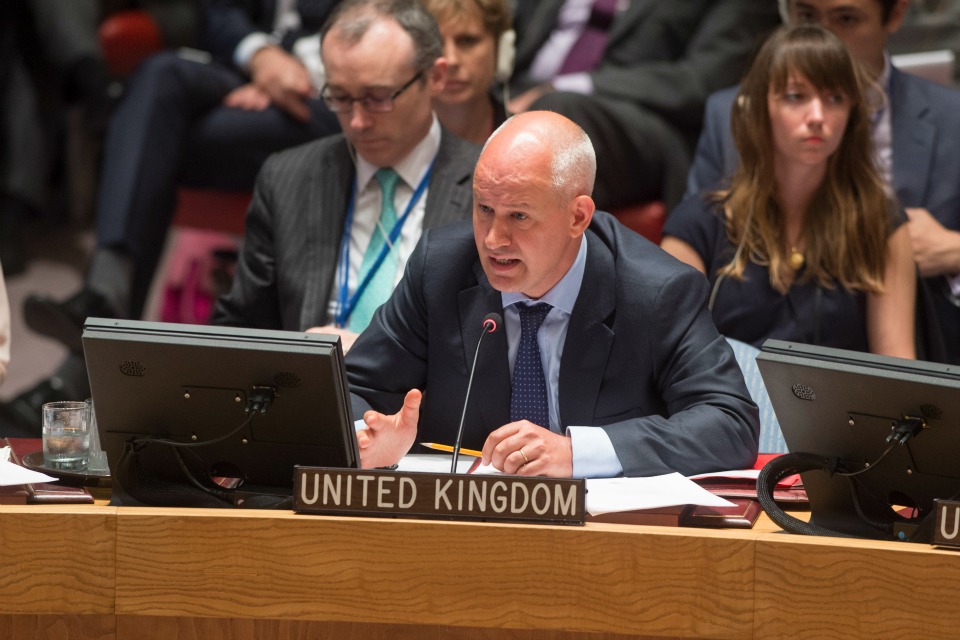"Starving civilians as a method of warfare is inhuman, unacceptable and prohibited under international humanitarian law."
Statement by Ambassador Peter Wilson of the UK Mission to the UN at the Security Council Meeting on Humanitarian Access in Syria

Thank you Mr President for convening this urgent meeting. And thank you Kyung-wha [Kang] for your sobering analysis of life in besieged and hard to reach areas in Syria.
In recent days, the world has seen this horror for itself. Images of emaciated men and women living under siege in Madaya, of children starving to death, evoke some of the darkest moments of our history. As a visiting United Nations official said earlier this week, “there are people in Madaya, but no life. What we saw should not happen in this century”.
In face of such horrors, we welcome that the United Nations, the ICRC and the SARC have reached Madaya this week. We should all applaud their efforts to negotiate a way in. But sadly, it is long overdue, and for some it is too late. And as we learn more about the desperate situation facing those in Madaya, it becomes ever clearer that ad hoc deliveries will not be enough; sustained access is now needed.
Madaya is just the tip of the iceberg. This tragic town represents just 10% of besieged areas, and only 1% of hard to reach areas in Syria. Many of these other areas have not been visited by the United Nations since October. If this status quo continues, theses images that we’ve seen from Madaya could be repeated many many times over.
Mr President, we cannot allow this to happen. With the eyes of the world on us today, let us send a clear message to the warring parties. Starving civilians as a method of warfare is inhuman, unacceptable and prohibited under international humanitarian law. As the Secretary General said in his statement yesterday, “In a conflict that has already reached shocking depths of inhumanity, the suffering [in Madaya] is another low”. We agree with him that this Council should call on all the parties, and especially the regime, which has the primary responsibility to protect Syrians, to allow unimpeded and sustained humanitarian access. And let Council members with ties to the regime use their influence, and not their air force, to address this horrific situation.
We all know that the solution is a political process that ends the war, and that to achieve this we must all work together. But as we do that, it is only right that we also draw international attention to the desperate situation in Madaya; a situation that is only worsening. It’s about putting pressure on all the parties to allow access, so that United Nations can reach the over 400,000 people in need in besieged areas – and over 4 million people in hard to reach areas.
The sheer scale of the humanitarian crisis should serve as a reminder to us all of the urgent need to support the United Nations relief effort. That is why the United Kingdom is hosting, alongside the United Nations, Norway, Kuwait and Germany, the London Conference on Supporting Syria and the Region on the 4th of February. The participation of my Prime Minister, and of the Amir of Kuwait, the German Chancellor, the Norwegian Prime Minister as well as the United Nations Secretary-General in London next month gives you a sense of the scale of our ambition.
The London Conference is about donor pledges, but it is also about much more than that. It is also the moment to address the longer term needs of those affected by the crisis; by supporting job creation, by providing education, and crucially, by putting even more pressure on the parties to protect civilians and respect international humanitarian law.
At the conference, leaders from 70 countries, from international organisations, civil society, NGOs and the private sector, will confront and condemn violence against civilians. We will rally support to mitigate the human impact of the worst violations and abuses. We will commit essential support to deliver safer communities, safer healthcare, and safer access to education in Syria. And in doing so, we hope to drive improvements in daily life and to deliver important confidence building measures to underpin the political process.
We should all be clear that the ultimate solution to Madaya’s woes, and to those facing all Syrians, rests on a political agreement, one that brings an end to the fighting. We must continue the unity this Council showed in December, and build on the agreement reached by the International Syria Support Group. We look forward to talks beginning later this month.
To make a success of these talks, and for the long-term future of Syria, we also need to work now to ensure that communities are protected, so that ultimately they can rebuild. And to do that, we must emphasise that even wars have rules.
For it will be through these talks, through sustained access to besieged areas, and through the London Conference, that we can make this the year that the suffering finally ends.
Thank you.